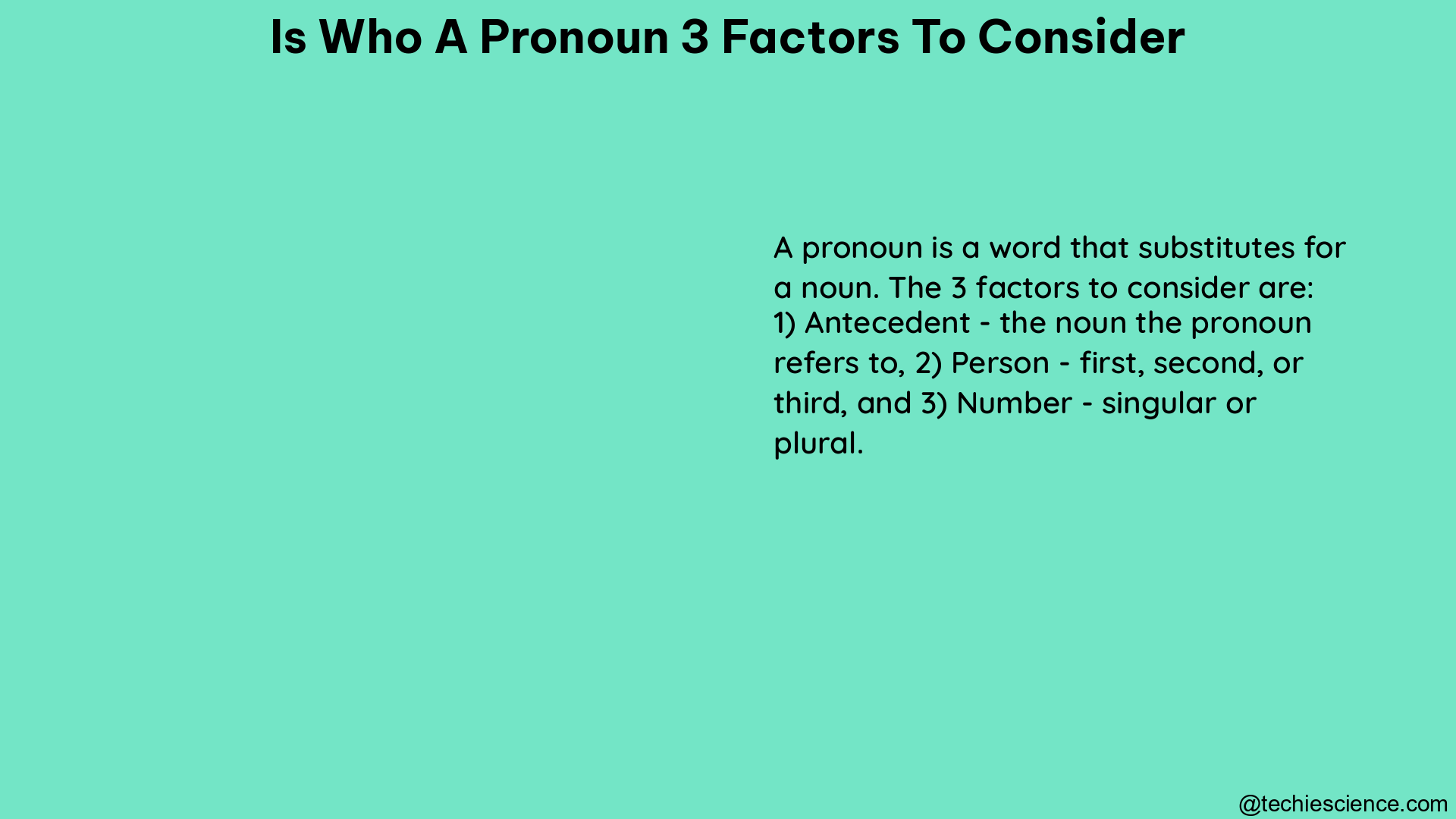“Who” is a pronoun, and there are three key factors to consider when using it correctly: subject vs. object, interrogative and relative pronouns, and formal vs. informal usage.
Subject vs. Object
The first factor to consider is whether “who” is being used as a subject pronoun or an object pronoun.
Subject Pronoun
When “who” is used as a subject pronoun, it refers to the person performing the action. For example:
- “Who is going to the store?”
In this sentence, “who” is the subject, as it refers to the person who is going to the store.
Object Pronoun
On the other hand, “whom” is used as an object pronoun, referring to the person receiving the action. For example:
- “Whom did you invite to the party?”
In this sentence, “whom” is the object, as it refers to the person who received the invitation.
It’s important to distinguish between subject and object pronouns to ensure grammatical correctness in your writing and speech.
Interrogative and Relative Pronouns

The second factor to consider is whether “who” is being used as an interrogative pronoun or a relative pronoun.
Interrogative Pronoun
As an interrogative pronoun, “who” is used to ask questions about the subject. For example:
- “Who ate the last cookie?”
In this sentence, “who” is used to ask a question about the subject, the person who ate the last cookie.
Similarly, “whom” is used as an interrogative pronoun to ask questions about the object. For example:
- “Whom did you see at the movies?”
In this sentence, “whom” is used to ask a question about the object, the person who was seen at the movies.
Relative Pronoun
“Who” and “whom” can also be used as relative pronouns to introduce subordinate clauses. For example:
- “The person who ate the last cookie is in trouble.”
In this sentence, “who” is used as a relative pronoun to introduce a subordinate clause that provides additional information about the person.
Understanding the difference between interrogative and relative pronouns is crucial for using “who” and “whom” correctly in your writing and speech.
Formal and Informal Usage
The third factor to consider is the formality of the context in which “who” and “whom” are used.
Formal Usage
In formal writing and speech, it is important to use “who” and “whom” correctly to maintain grammatical accuracy. For example:
- “Whom did you meet at the party?”
This sentence uses “whom” correctly as the object pronoun, which is the preferred usage in formal contexts.
Informal Usage
However, in informal spoken English, “who” is often used even when “whom” would be the grammatically correct choice. For example:
- “Who did you meet at the party?”
While this sentence uses “who” instead of “whom,” it is a common informal usage that is widely accepted in casual conversation.
It’s important to be aware of the formality of the context and adjust your usage of “who” and “whom” accordingly to ensure your writing and speech are appropriate for the situation.
Examples
Here are some additional examples to illustrate the use of “who” and “whom” in different contexts:
- “Who is going to the store?” (Subject: Who is performing the action)
- “Whom did you invite to the party?” (Object: Whom received the invitation)
- “Who ate the last cookie?” (Interrogative: Asking about the subject)
- “Whom did you see at the movies?” (Interrogative: Asking about the object)
- “The person who ate the last cookie is in trouble.” (Relative: Introducing a subordinate clause)
References
- The Week. (n.d.). How and when to use ‘whom’ instead of ‘who’. Retrieved from https://theweek.com/articles/450033/how-when-use-whom-instead-who
- St. Louis Community College. (n.d.). Choosing the Right Pronoun and Who or Whom. Retrieved from https://stlcc.edu/student-support/academic-success-and-tutoring/writing-center/writing-resources/choosing-pronoun-who-or-whom.aspx
- Wikipedia. (n.d.). Who (pronoun). Retrieved from https://en.wikipedia.org/wiki/Who%27s

The lambdageeks.com Core SME Team is a group of experienced subject matter experts from diverse scientific and technical fields including Physics, Chemistry, Technology,Electronics & Electrical Engineering, Automotive, Mechanical Engineering. Our team collaborates to create high-quality, well-researched articles on a wide range of science and technology topics for the lambdageeks.com website.
All Our Senior SME are having more than 7 Years of experience in the respective fields . They are either Working Industry Professionals or assocaited With different Universities. Refer Our Authors Page to get to know About our Core SMEs.